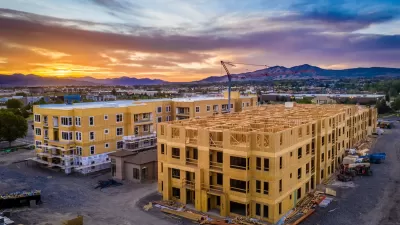The Biden administration plans to expand the federal housing voucher program, which currently provides rental assistance to 2.3 million U.S. households.

Results from a Department of Housing and Urban Development (HUD) study that began in 2008 show that "[p]riority access to a long-term housing subsidy led to by far the best outcomes for reducing family homelessness 3 years after random assignment," reports Jared Brey in NextCity. "It’s one of numerous studies that show the housing choice voucher program is an important lifeline for thousands of low-income families who might otherwise be unable to find an apartment. Despite that, the federal government currently only funds enough vouchers for about a quarter of families that qualify for the benefit. In many cities, the waiting list for a voucher is years long — or closed entirely."
The Biden administration is seeking to expand the federal housing voucher program by adding $5.4 billion to its budget "and creating vouchers for an additional 200,000 families, beyond the 2.3 million existing voucher holders." Housing advocates praise the move, citing "significant evidence" that the program works more effectively than other interventions.
The proposal still "falls short of Biden’s campaign promise calling for the voucher program to be funded so that every qualifying family can receive one," and voucher recipients face their own set of challenges. Some landlords discriminate against voucher holders, limiting their options and reducing their mobility and access to jobs and amenities. But advocates see the proposal as a hopeful sign for making rental assistance a much more substantial part of federal housing policy, while HUD Secretary Marcia Fudge said that the request "turns the page on years of inadequate and harmful spending requests" that crippled the department's ability to meet the country's housing needs. Douglas Rice, a senior fellow on the housing policy team at the Center on Budget and Policy Priorities, agrees. "I think it’s an important signal of what their priorities are going to be in terms of low-income housing policy."
FULL STORY: How Expanding Vouchers Could Improve Housing Stability

Alabama: Trump Terminates Settlements for Black Communities Harmed By Raw Sewage
Trump deemed the landmark civil rights agreement “illegal DEI and environmental justice policy.”

Study: Maui’s Plan to Convert Vacation Rentals to Long-Term Housing Could Cause Nearly $1 Billion Economic Loss
The plan would reduce visitor accommodation by 25% resulting in 1,900 jobs lost.

Why Should We Subsidize Public Transportation?
Many public transit agencies face financial stress due to rising costs, declining fare revenue, and declining subsidies. Transit advocates must provide a strong business case for increasing public transit funding.

Paris Bike Boom Leads to Steep Drop in Air Pollution
The French city’s air quality has improved dramatically in the past 20 years, coinciding with a growth in cycling.

Why Housing Costs More to Build in California Than in Texas
Hard costs like labor and materials combined with ‘soft’ costs such as permitting make building in the San Francisco Bay Area almost three times as costly as in Texas cities.

San Diego County Sees a Rise in Urban Coyotes
San Diego County experiences a rise in urban coyotes, as sightings become prevalent throughout its urban neighbourhoods and surrounding areas.
Urban Design for Planners 1: Software Tools
This six-course series explores essential urban design concepts using open source software and equips planners with the tools they need to participate fully in the urban design process.
Planning for Universal Design
Learn the tools for implementing Universal Design in planning regulations.
Smith Gee Studio
Alamo Area Metropolitan Planning Organization
City of Santa Clarita
Institute for Housing and Urban Development Studies (IHS)
City of Grandview
Harvard GSD Executive Education
Toledo-Lucas County Plan Commissions
Salt Lake City
NYU Wagner Graduate School of Public Service





























